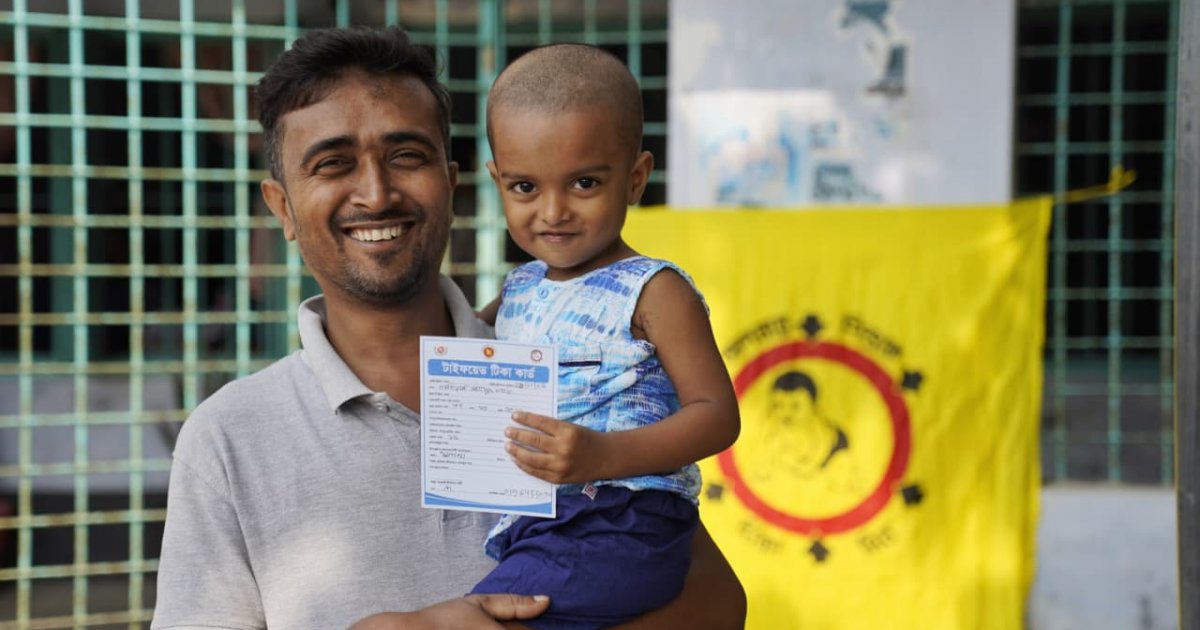The Government of Bangladesh, with technical and logistical support from Unicef, Gavi, the Vaccine Alliance, and the World Health Organization (WHO), has been conducting a nationwide Typhoid Conjugate Vaccine (TCV) campaign since October 12 to protect millions of children and adolescents from typhoid fever, a persistent public health threat in the country.
“Typhoid fever, caused by the Salmonella Typhi bacterium, remains one of the major water- and food-borne diseases in Bangladesh,” said Gavi Senior Country Manager Dirk Gehl, adding: “This campaign, targeting around 50 million children aged 9 months to under 15 years, represents a major step forward in the global fight against drug-resistant typhoid. It also highlights Bangladesh’s commitment to protecting its most vulnerable population, children and young adolescents.”
A nationwide effort in two phases
The campaign is being rolled out in two phases. The first phase covered schools and madrasas, including pre-primary, primary, secondary, and English-medium institutions, while the second phase, running from November 1–13, extends to community outreach sites across the country.
According to Unicef, the organization has not only supplied vaccines but also strengthened cold-chain infrastructure, developed operational guidelines, training materials, and supported mass awareness campaigns to ensure no eligible child, including street children and those outside formal schooling, is left behind.
“Typhoid remains a serious global health threat, infecting 9 million people annually and causing over 110,000 deaths worldwide,” said a Unicef spokesperson. “In Bangladesh, nearly 8,000 people die each year, 68% of whom are under 15. The rise of antibiotic-resistant strains makes vaccination one of the most powerful tools for prevention.”
So far, over 38 million children have been vaccinated nationwide, with the campaign aiming for at least 95% coverage to establish strong community immunity.
Public doubts and misinformation
Despite the campaign’s scale, a portion of parents remains hesitant. Social media has seen a wave of vaccine-related misinformation, discouraging some from registering their children for vaccination.
Concerns such as “is it safe for my child?” or “what if there are side effects?” have circulated widely online.
Public health experts attribute some of this skepticism to residual distrust following the Covid-19 vaccination period. “Some people took multiple Covid booster doses yet still fell ill. That experience has led to misplaced doubts about vaccines in general,” explained one health researcher. “But there is absolutely no reason for fear; the typhoid vaccine is safe and effective.”
Officials have reiterated that the TCV is WHO-approved, halal-certified by the Jamiat Ulama-i-Hind Halal Trust, and free of cost for all children aged 9 months to under 15 years until November 13. After that date, the vaccine will only be available privately, costing between Tk3,000–4,000 per dose.
Progress and challenges in Khulna division
In Khulna division, Dr Md Mujibur Rahman, divisional health director, reported that out of a target of 4,284,303 recipients, 3,762,095 have already been vaccinated, a 95.3% coverage rate.
“While Khulna is slightly behind the national average, we have effectively achieved our target,” said Dr Rahman. “Districts like Bagerhat and Meherpur lag slightly due to staffing shortages; nearly 63% of health assistant positions remain vacant in community clinics there.”
He added: “After November 13 (Thursday), no free TCV doses will be available. Parents who miss this opportunity will have to purchase the vaccine privately. Given that typhoid claims about 22 lives daily, most of them children, we urge everyone to vaccinate without delay.”
Voices from the field
Unicef’s Khulna Chief Field Officer, Md Qausar Hossain, acknowledged both progress and challenges, saying: “Compared to other vaccines, this one is remarkably safe. However, rumors and staff shortages have made full coverage difficult.”
“Interestingly, this time misinformation is spreading more among educated groups — people who should know better,” he said.
Dr Tapash Kumar Halder, national urban EPI specialist at Unicef, noted that the WHO has approved three typhoid vaccines globally, but the TCV used in Bangladesh is the most effective and has the least side effects, providing up to 85% protection.
He added: “Some parents do not value it because it is free, while others assume it is unnecessary. But this is the safest, most scientifically proven vaccine available.”
Dr Md Ariful Islam, WHO’s national professional officer for Khulna, reaffirmed the vaccine’s safety record, saying: “Out of 3.7 million doses administered in Khulna, only 76 minor cases of mild fever or pain have been reported, an extremely low rate compared to other vaccines.”
He emphasized that Bangladesh maintains strict cold-chain management, ensuring vaccine quality and potency at all levels.
Field reports: Schools embrace the campaign
At Khulna Model Government Primary School, vaccination was in its third round. Headteacher Eliza Parvin said: “Out of 312 students, 205 have received the vaccine, and none reported any adverse reactions.”
Parents like Ronok Sheikh, who initially hesitated, later decided to vaccinate their children after recalling past family tragedies linked to typhoid. “My cousin’s son died of typhoid a few years ago. I do not want my child to face the same fate,” he said.
At Sristi Central School, administrative officer Khondkar Sohag confirmed that misinformation had discouraged some parents. “Some refused due to illness or parental objections. Others feared rumors spread online, like claims that the vaccine causes hair loss or infertility. But none of our vaccinated students had any problems.”
Similarly, FM Harunur Rashid, principal of Dak Division Secondary School, said: “A few local people went door to door spreading bizarre rumors that the vaccine causes loss of strength or male infertility. As a result, some parents pulled their children out of the campaign.”
In another case, Yasna Parvin, a mother at the same school, said her son had typhoid at age five and was vaccinated privately three years ago at a cost of Tk3,000. “Now, others are getting it for free. That is a blessing,” she said.
A call for extended deadlines
Many field officers and parents are requesting that the vaccination period be extended by another week to ensure wider coverage.
“Some parents are unaware of the schedule,” said one father waiting with his child at a local school. “If the deadline is extended, many more can benefit.”
Local health supervisors are also innovating to boost participation. Abdul Sattar, health supervisor of Ward 18 under Khulna City Corporation, created a WhatsApp group with 25 local school teachers to share updates, schedules, and registration reminders in real-time.
Dr Rahman said: “This vaccine is safe, halal, WHO-approved, and life-saving. Every missed dose is a missed chance to save a child’s future.”



